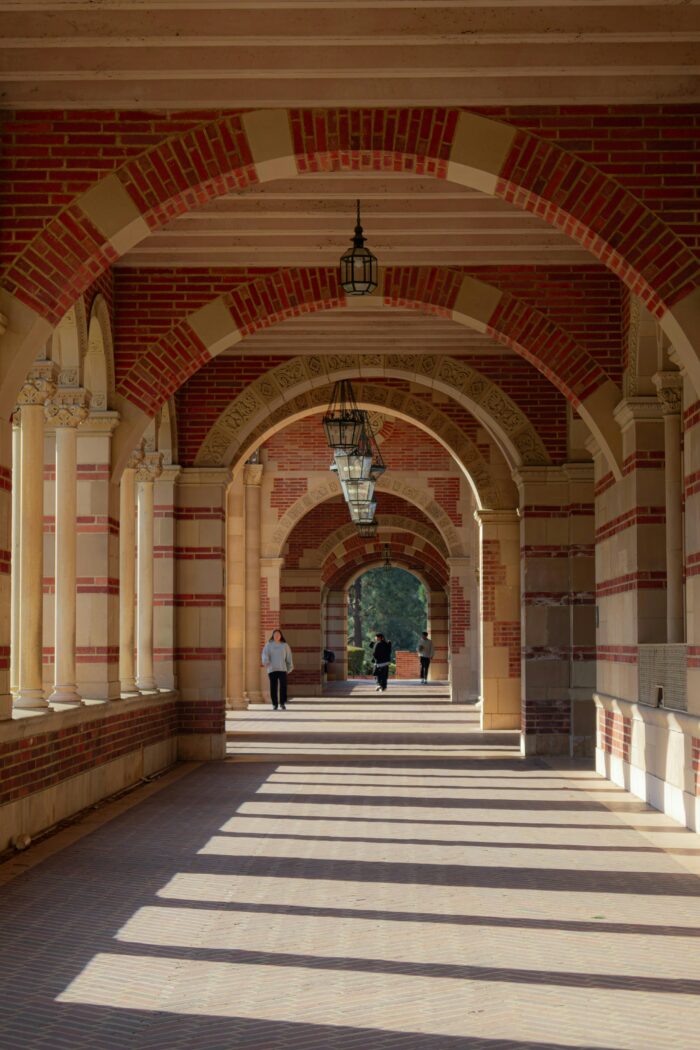Less than 15 miles apart, UCLA and USC sit on opposite ends of Los Angeles—and for many applicants, opposite ends of a life-defining decision. The Westwood and University Park campuses both offer access to elite academics, global alumni networks, and a launchpad into industries from tech to entertainment. But similarities end there.
UCLA, as a top-ranked public institution, boasts a competitive admissions process, a sprawling campus culture, and a research-driven environment tethered to the UC system’s mission. USC, a leading private university, offers a different promise: tightly woven alumni connections, specialized pre-professional programs, and a brand rooted in Trojan pride and entrepreneurial drive. Each school offers its own version of success—and which one fits best depends entirely on your goals.
Whether you’re drawn to the public service ethos of UCLA or the career acceleration engine of USC, clarity is key. This guide will break down what distinguishes these two schools across academics, campus life, professional outcomes, and cultural fit.
Still undecided? Let us help you sharpen your strategy. A targeted consultation with our admissions experts can make the difference between a hopeful application and a compelling, customized pitch.
Admissions Landscape: What It Takes to Get In
If you’re staring down the UCLA vs. USC decision, start with the admissions math—and be ready for a numbers game that’s as strategic as it is selective.
Acceptance Rates
- UCLA: With an admit rate around ~8%, UCLA is one of the most competitive public universities in the country. High GPAs and top test scores won’t guarantee entry; it takes strategic storytelling to stand out.
- USC: Slightly higher, but still fiercely competitive at ~11%. USC casts a wide net nationally and internationally, but doesn’t sacrifice selectivity.
Private vs. Public: What That Means for You
- USC’s private status gives it flexibility: rolling merit aid, smaller class sizes in certain programs, and fewer bureaucratic hurdles when it comes to major changes or interdisciplinary work.
- UCLA, as part of the University of California system, adheres to public mandates—more predictable in structure, but also more rigid in its policies. The UC application is a unique beast, requiring a focused, thematic approach across multiple personal insight questions.
Cost Considerations: Sticker Shock vs. Real Value
USC Tuition: Around $66,640/year. Substantial merit aid and need-based grants can bring this down, but don’t count on it unless your application screams standout.
UCLA Tuition: In-state sits around a cheap ~$13,800/year – unbeatable value if you’re a California resident. For out-of-state, you’re looking at ~$46,300/year – still cheaper than USC, but without the same level of merit aid opportunities.
Who Has the Edge?
- California Residents: UCLA offers Ivy-tier academics at a fraction of the cost—if you can get in.
- Out-of-State Applicants: It’s a tougher call. USC offers more personalized attention and flexibility, but it comes at a premium. UCLA may save you money, but it demands a strategic application tailored to a broader, more impersonal review process.
In a tie, the edge goes to whoever’s done their homework—and positioned their application accordingly.
Academic Strengths & Reputation
Academic prestige matters—but it doesn’t mean the same thing for every applicant. If you’re looking at rankings alone, UCLA edges out USC with a U.S. News 2024 ranking of #15 versus USC’s #28. That’s no small gap, especially for industries where prestige is currency. But dig deeper, and you’ll find the real story lies in specialization, industry alignment, and institutional investment in your future field.
Specializations: Know Your Powerhouse
USC shines in:
- Film & Television: The School of Cinematic Arts is unmatched—think Spielberg, Lucas, and a pipeline into Hollywood.
- Business: Marshall School of Business is deeply networked, globally recognized, and known for its entrepreneurial bent.
- Engineering: Viterbi School offers top-tier programs in AI, cybersecurity, and aerospace, often in close partnership with industry leaders.
UCLA excels in:
- Life Sciences: From neuroscience to microbiology, UCLA’s emphasis on interdisciplinary research stands out.
- Engineering: The Henry Samueli School is research-intensive, with strong ties to Silicon Beach and biotech firms.
- Social Sciences: Sociology, political science, and psychology departments are consistently ranked in the top 10 nationally.
Industry Reputation: Who Knows Your Name?
Film & Entertainment: It’s not even close—USC is the industry standard. The alumni network is a who’s who of creatives and execs, and students get hands-on access to LA’s entertainment core.
Healthcare, Medicine, and Research: UCLA dominates, with the David Geffen School of Medicine and affiliations with top hospitals. If your path touches biology, public health, or medical research, UCLA is the better launchpad.
Tech & Engineering: A toss-up. Both schools are in the heart of the SoCal tech corridor, but USC may offer more entrepreneurial momentum, while UCLA leans more academic and research-focused.
Faculty & Research: Who’s Funding Your Future?
UCLA: A research juggernaut, with $1.7 billion in annual research expenditures. Think NSF grants, NIH funding, and campus-wide initiatives in sustainability, AI, and global health.
USC: Smaller in scale, but targeted. USC invests heavily in interdisciplinary innovation, especially in biotech, communication, and urban planning. Its Information Sciences Institute (ISI) and innovation hubs offer plenty of high-impact opportunities.
Bottom line? If you’re chasing prestige and academic horsepower, UCLA delivers. But if your goals require hands-on, industry-embedded training—especially in business or entertainment—USC may be the smarter play.
Campus Life & Student Experience
Size doesn’t just shape your class schedule—it defines your day-to-day experience. With ~21,000 undergraduates, USC offers a more intimate, private-school feel. By contrast, UCLA’s ~32,000 undergrads create the dynamic pulse of a bustling public campus. One isn’t better than the other—but one might fit you better.
Culture and Community
USC leans tight-knit. With smaller classes and a campus layout that encourages proximity, students often describe a close, collaborative vibe. The Trojan Family is more than branding—it’s a genuine network, and many undergrads say they feel “seen” by faculty and peers.
UCLA is high-energy and multifaceted. The scale adds layers of opportunity—and bureaucracy. You’ll encounter more diversity of thought, background, and interest, but you may have to work harder to carve out your niche.
Housing, Clubs, and Greek Life
Housing: Both schools guarantee freshman housing. USC’s residential colleges offer strong built-in communities, while UCLA’s “Hill” is practically its own city—vibrant, walkable, and teeming with events.
Clubs: Expect hundreds at both. UCLA’s size means sheer volume; USC’s focus on pre-professionalism means targeted depth—especially in media, business, and tech.
Greek Life: Bigger at USC and more culturally central to campus identity. At UCLA, it’s a component—not the core—of student life.
Academic Calendar: Pacing Matters
USC uses the semester system: Two 15-week terms. Ideal for in-depth exploration, internships during the school year, and a more traditional rhythm.
UCLA operates on the quarter system: Three 10-week sprints. Fast, intense, and ideal for students who like momentum and breadth—but not for procrastinators.
Choosing between these schools means choosing a lifestyle. Are you energized by crowds and crave scale? UCLA could feel like home. Prefer a curated, tight-knit college experience with more breathing room? USC might be your better match.
Location, Location, Location
Both schools boast the same skyline and sun—but the feel of their locations couldn’t be more different. Your campus environment will shape not just your weekends but your professional trajectory.
Where You’ll Live
USC sits in the South Figueroa District, just south of Downtown LA. It’s urban, gritty, and fast-moving. Campus security is robust, and the school has invested heavily in surrounding infrastructure, but you’ll still want to stay alert off-campus.
UCLA, on the other hand, is nestled in Westwood, an affluent, tree-lined neighborhood that borders Beverly Hills and is minutes from Santa Monica. It’s cleaner, calmer, and feels more traditionally collegiate.
Safety, Vibe, and Day-to-Day Life
USC: The immediate area has improved significantly in recent years, thanks to the USC Village and partnerships with LAPD, but it’s still very much an urban core. Students learn city smarts quickly and gain access to a raw, real-world energy.
UCLA: Feels like a campus within a postcard. Westwood is packed with cafes, theaters, and students. You’re more likely to bump into a celeb than a protest.
Career Access: Who’s Next Door?
Los Angeles is a professional goldmine if you know where to dig. Both schools have direct pipelines into:
- Tech: Santa Monica (“Silicon Beach”) houses Google, Snap, and dozens of startups. Both schools offer access, but UCLA is closer.
- Media & Entertainment: USC dominates. Its alumni are decision-makers at studios, agencies, and production companies. Students often intern within walking distance.
- Finance & Consulting: More competitive, but both schools punch above their weight. USC’s alumni network can open doors in LA and beyond, especially in boutique firms and early-stage VC.
Location won’t make or break your career—but it will shape how often opportunity knocks. The key is choosing the campus that positions you where you’ll thrive, not just survive.
Outcomes and Alumni Networks
Numbers first: both schools boast strong graduation rates—~92% for USC and ~91% for UCLA—a statistical tie that signals institutional stability and student satisfaction. So, if you’re hunting for meaningful outcomes, look past the diploma and into the network behind it.
Alumni Influence
USC‘s Trojan Network is infamously loyal and action-oriented. Especially in entertainment, venture capital, and startup circles, being a USC grad gets callbacks, intros, and seats at the table. The school has an unusually tight alumni culture—think private LinkedIn groups, internal job boards, and an “always take the call” ethos.
UCLA‘s alumni base is larger, more diffuse, and deeply embedded in healthcare, government, education, and non-profits. It’s a massive network that flexes power in quieter but no less impactful ways—especially in the UC system, global research institutions, and public sector leadership roles.
Career Support & Perception
USC invests heavily in career services, with industry-specific advising and strong on-campus recruiting, especially for business, engineering, and cinematic arts. Employers know what they’re getting.
UCLA offers similarly robust career resources, but with more volume—and more competition for counselor attention. That said, its name carries serious weight in research, academia, and any field where the UC brand adds credibility.
Choose the network that aligns with where you want to go—not just who you are now.
The Verdict: Which Is Right for You?
UCLA and USC aren’t just rivals—they’re radically different launchpads. UCLA offers Ivy-level academics at a public-school price, especially for in-state students. It’s ideal for those drawn to research, healthcare, public service, or fast-paced academics. Meanwhile, USC’s private-school polish, intimate campus, and industry-embedded programs make it a magnet for film, entrepreneurship, business, and students seeking high-touch career services.
Here’s a quick breakdown:
- In-state student prioritizing value + research? UCLA wins.
- Out-of-state applicant seeking pre-professional polish + networking? USC may deliver more ROI.
- Engineering or tech? Both excel—pick based on campus culture and learning pace.
- Undecided major with broad interests? UCLA’s diversity and quarter system offer more sampling room.
- Laser-focused on media or startups? Trojan connections can be game-changing.
Ultimately, this choice isn’t about who wins the crosstown rivalry—it’s about what fits your vision for the next four years, and the forty after. Rankings and data tell part of the story. But admissions success? That depends on how well you frame your story to each school’s priorities.
Schedule your free consultation today and get insider insights that go beyond rankings and stats. Let’s turn uncertainty into a strategy—and a strategy into an admit.





